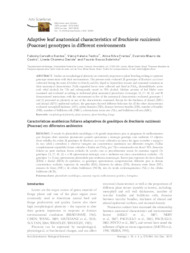Adaptive leaf anatomical characteristics of Brachiaria ruziziensis (Poaceae) genotypes in different environments.
Adaptive leaf anatomical characteristics of Brachiaria ruziziensis (Poaceae) genotypes in different environments.
Autoria: SANTOS, F. C.; TECHIO, V. H.; FREITAS, A. S.; CASTRO, E. M. de; DAVIDE, L. C.; SOUZA SOBRINHO, F. de
Resumo: Studies on morphological plasticity are extremely important to plant breeding seeking to optimize genotype interactions with their environments. The present study evaluated 38 genotypes of Brachiaria ruziziensis cultivated during the rainy (October to March) and dry (April to September) seasons and examined variations in their anatomical characteristics. Fully expanded leaves were collected and fixed in FAA70 (formaldehyde: acetic acid: ethyl alcohol) for 72h and subsequently stored in 70% alcohol. Median sections of leaf blades were examined and evaluated according to traditional plant anatomical procedures. Genotypes 15, 27, 40, 53, and 90 demonstrated interactions with the environment in five of the anatomical characteristics evaluated; genotypes 1 and 33 presented no plasticity in any of the characteristics examined. Except for the thickness of abaxial (ABT) and adaxial (ADT) epidermal surfaces, the genotypes showed different behaviors for all the other characteristics evaluated: mesophyll thickness (MT), xylem diameter (XD), distance between bundles (DB), number of bundles (NB), number of bulliform cells (NBC), sclerenchyma tissue area (%L), and bulliform cell area (ABC).
Ano de publicação: 2013
Tipo de publicação: Artigo de periódico
Unidade: Embrapa Gado de Leite
Palavras-chave: Morphological plasticity, forage, plant anatomy, plant breeding
Observações
1 - Por padrão são exibidas publicações dos últimos 20 anos. Para encontrar publicações mais antigas, configure o filtro ano de publicação, colocando o ano a partir do qual você deseja encontrar publicações. O filtro está na coluna da esquerda na busca acima.
2 - Para ler algumas publicações da Embrapa (apenas as que estão em formato ePub), é necessário ter, no celular ou computador, um desses softwares gratuitos. Sistemas Android: Google Play Livros; IOS: iBooks; Windows e Linux: software Calibre.
Acesse outras publicações
Acesse a Base de Dados da Pesquisa Agropecuária (BDPA) para consultar o acervo completo das bibliotecas da Embrapa.

